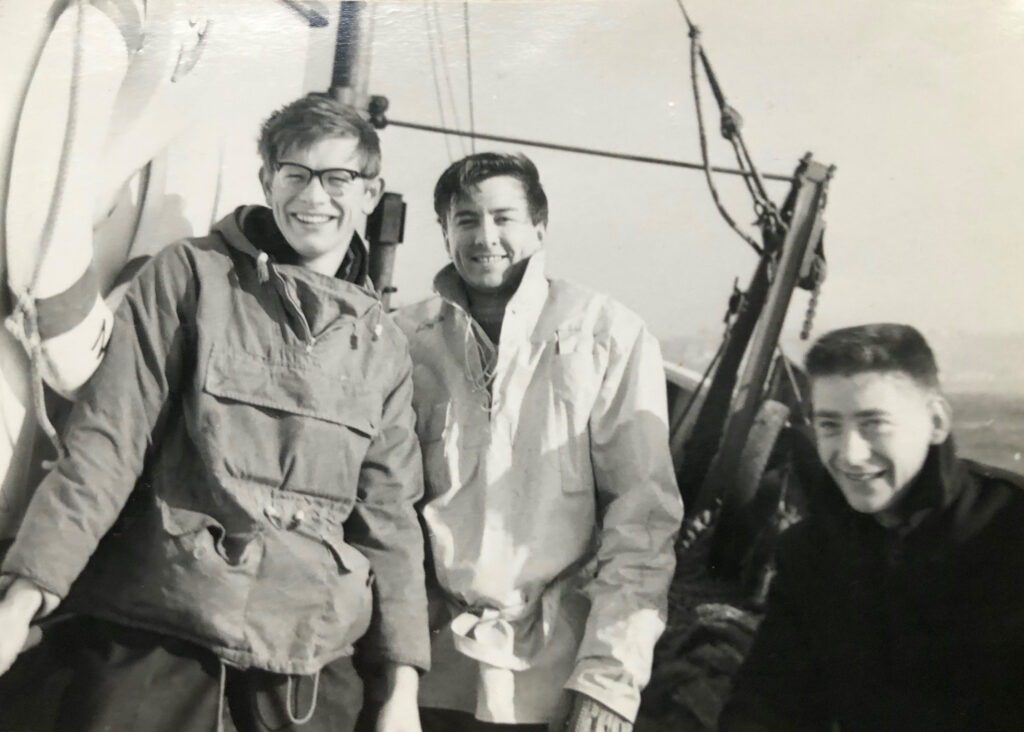
MBA Member John Spencer was a Research Officer for Central Electricity Research Laboratories (CEGB) and was out stationed to Peake’s Farm Laboratory, Bradwell Nuclear Power Station in Essex.
John’s first visit to the Marine Biological Association (MBA) was around 1963 to attend a training course for National Institute of Oceanography (NIO) chemists about to take part in an Indian Ocean Expedition later that year.
Here he reflects on the vital knowledge gained and fond memories he made during his time at the MBA.
Training at the MBA
“I was invited by Sir Frederick Russell, Director of the MBA at that time and a Member of the Biological advisory Panel to the then CEGB, who were required at that time to conduct continuing marine biological monitoring at Bradwell, Britain’s first commercial Nuclear Power Station.
There was some public alarm in respect of nuclear safety and that plankton would die and settle on the oyster beds with adverse effects to the Oyster fishery. In addition, one university commented that, “There would be jellyfish as large as dustbin lids”!
The training course covered water sampling from the MBA research vessel, Sarsia, using Nansen bottles and towed phytoplankton nets together with methods of chemical analysis specifically for sea water.
Regular mentoring and reflective thinking sessions with Dr LHN Cooper brought depth to our learning. We also carried out shore surveys and visits to the Aquaria, putting water chemistry and marine flora and fauna, into perspective.
Sampling off the breakwater one day the weather changed rapidly to a storm with high waves of several metres, and it was impossible for the survey vessel to turn around safely for the return to harbour. The skipper advised that we should hold our position, and we did, for four hours.
We learnt to trust the skipper and that there was only one skipper on a ship, a lesson that came up more than once over the next 35 years that I worked in and off the mouth of the Blackwater Estuary and at other coastal locations around the UK.
Laboratory Chemist John Armstrong was responsible for our training and advised us to become Life Members of the MBA. The cost, 15 Guineas was near enough a week’s wages, but inspired by the MBA over the next few weeks and how much it would play into my working life, going forward, I took the opportunity and became a Life Member before returning home.
This early visit to the MBA and the experience gained put me in good stead for my future career with the CEGB.”
Putting training into practice: Working at Bradwell Power Station
“As an analytical chemist, I provided the chemical and hydrographical data to support the marine biological surveys, but quickly found myself an essential part of the vital studies to identify and measure fish catch. Those earlier foreshore studies at the MBA quickly came into relevance.
Over time, our work at Bradwell expanded to include many power stations throughout the UK, with pre-commissioning and post commissioning comparative surveys which helped the design of cooling water systems for new stations.
This led to several visits over the years to the National Marine Biological Library (NMBL) which holds some of our internal reports and papers.
In my retirement I have continued my interests and practice in marine science through the reading of the Journal of the Marine Biological Association (JMBA) and The Marine Biologist Magazine.
As a Rotarian, I support our local secondary school with sixth form mock interviews. At these, pupils often ask about a career in Marine Biology, and I am happy to advise that they should log on to the MBA website as a good starting point.”
John Spencer. LRIC, BSc, PGCE, AMIQA, Mem. MBA, PP2, PHF.
Rotary Club of Highcliffe on Sea